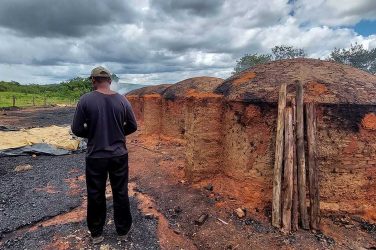Many countries in Latin America have recently turned toward leftist populism. But most observers argue this is not a uniform trend. They often point to Brazil whose leftist President Lula favors free market economics.
Charismatic Luiz Inácio Lula da Silva rose from humble origins. A former shoeshine boy and metalworker, he became Brazil’s first left-wing president in four decades after defeating his rival by a wide margin in October 2002.
During that campaign, which was his fourth run for the presidency, Mr. Lula toned down his rhetoric and emphasized that he and his Workers’ Party had moved toward the political center.
Peter Hakim, President of the Inter-American Dialogue, a Washington-based center for policy analysis, says Mr. Lula honed his political skills during the 1970s as a fiery union leader, who went on to head a fast growing leftist political movement, the Workers’ Party.
He adds that for 25 years, Brazil’s president has been a genuine force for social change. "He is just a formidable leader," says Hakim.
"He is a figure that has been present on the political scene for many years. He is viewed as a fighter for the poor, as someone who stands in the corner of Brazil’s poorest sectors. He was the man of the left that fought against the military government. He has always had a strong commitment to democracy and human rights."
Misplaced Fears
Under President Lula’s watch, says Peter Hakim, Brazil’s modern competitive economy has improved; inflation is down, exports are booming, unemployment has fallen and economic growth is steady.
According to analyst Hakim, President Lula’s policies are a result of his experience. "I think when somebody has been in politics as long as Lula, it’s impossible not to learn quite a bit of economics. His political party was running a number of Brazilian cities; several governors came from his party. They had a large representation in Congress. It’s not surprising that they understood that the management of the basic economy was fundamental to any kind of political success."
Most observers agree that fears that President Lula would introduce populist measures, like the expropriation of property or special taxes that would be harmful to industry, were misplaced.
Political scientist David Victor at Stanford University in California is a longtime Brazil watcher. who says, "Lula has made an active effort to put people into place that would manage the economy much as his predecessors did.
"That, for example, is why his finance minister and his whole team running the economy has for the most part been more responsible and better rooted in basic principles of market economics. The economy as a whole has still not preformed up to full expectation. But it could have been a lot worse. And I credit the Lula administration for successfully navigating this course."
Professor Victor says one of Brazil’s economic successes under President Lula has been energy independence.
Needed Reforms
But Mark Weisbrot, co-director of the Center for Economic Policy Research in Washington, argues that Mr. Lula’s administration has shied away from necessary economic restructuring. He says it has failed to open the country to much needed private investment and its high taxes and tight monetary policy have stifled Brazil’s annual economic growth, which during President Lula’s tenure has averaged a disappointing 2.7 percent.
Weisbrot warns, "They have to change the macro-economic policies. They have to lower the interest rate and the exchange rate, most importantly. And as the economy starts to grow at a reasonable rate, then they can also start thinking about the kind of industrial policies that the Workers’ Party promised.
"It was a very fast growing country in the decades prior to 1980, and if it had continued at that rate Brazil would have a European living standard today. That’s the difference that kind of growth makes."
According to other critics, President Lula has not done enough to alleviate the plight of his core constituents – the poor. Furthermore, they say, his government has been caught up in two scandals involving illegal contributions to the Workers’ Party in return for political favors and the buying of votes in Congress.
Still, the President’s popularity has not diminished. According to recent public opinion surveys, he has a double-digit lead over his two rivals in this year’s presidential campaign. Mr. Lula says his four-year mandate was too short for any radical change, which Brazil’s entrenched interest groups have resisted for more than a decade. He promises such measures if he’s re-elected.
Regional Power House
David Victor, who directs Stanford University’s Program on Energy and Sustainable Development, suggests that further economic reforms in Brazil would be a boon for the region as Brazil’s economy represents about 35-to-40 percent of Latin America’s gross domestic product.
"So to the extent the Brazilian economy grows, that’s good news for the entire continent because that leads to additional trading relationships. It leads, for example, to greater demand for natural gas, which will come from Bolivia, which is good for Bolivia. Closer trade between Argentina and Brazil will help stabilize the Argentine economy. When Brazil grows, Latin America grows," says Victor.
Most analysts agree that with an area bigger than all 25 European Union countries combined and a population of 186 million, which equals the rest of South America, Brazil is a potential powerhouse for Latin America.
Peter Hakim of the Inter-American Dialogue predicts that better economic performance in Brazil would also invite more U.S. business.
He says, "If Brazil starts to grow rapidly, it will become an enormously attractive market and setting for the United States. I think U.S. interests in Brazil have waned over the recent years because of its slower growth. Any pick up in that growth would draw enormous attention from U.S. corporations, investors, traders and the like."
More importantly, say many analysts, renewed economic expansion could help shrink the enormous gap between Brazil’s haves and have-nots.
VoA





